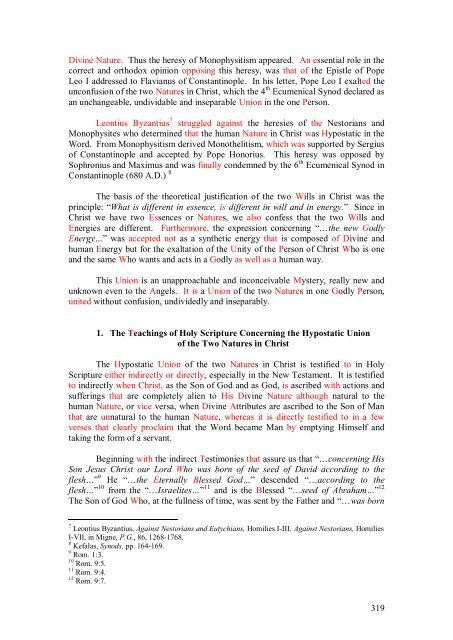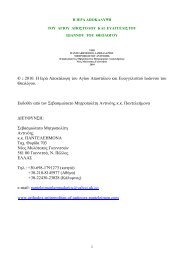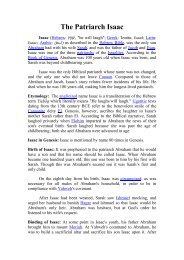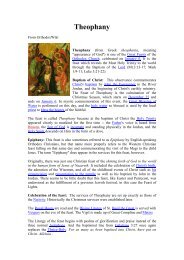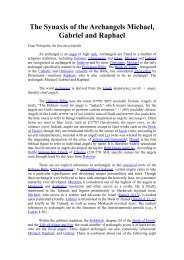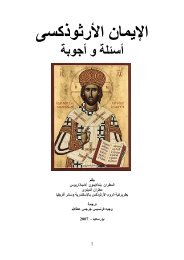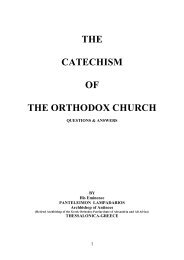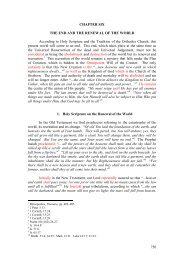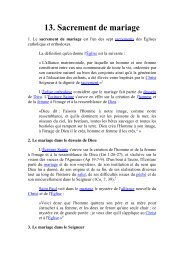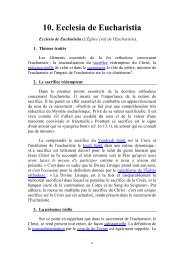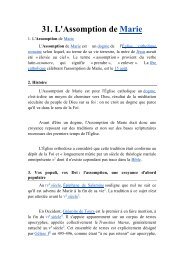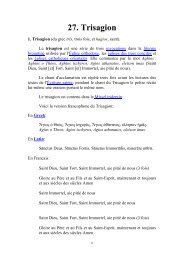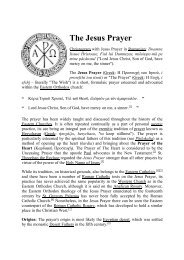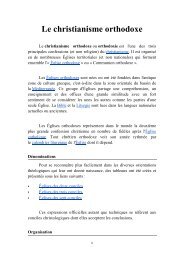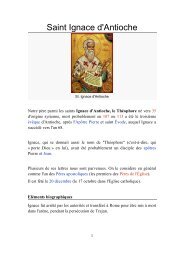028 part 3 chapter 6 the hypostatic union - Orthodox-mitropolitan-of ...
028 part 3 chapter 6 the hypostatic union - Orthodox-mitropolitan-of ...
028 part 3 chapter 6 the hypostatic union - Orthodox-mitropolitan-of ...
Create successful ePaper yourself
Turn your PDF publications into a flip-book with our unique Google optimized e-Paper software.
Divine Nature. Thus <strong>the</strong> heresy <strong>of</strong> Monophysitism appeared. An essential role in <strong>the</strong><br />
correct and orthodox opinion opposing this heresy, was that <strong>of</strong> <strong>the</strong> Epistle <strong>of</strong> Pope<br />
Leo I addressed to Flavianus <strong>of</strong> Constantinople. In his letter, Pope Leo I exalted <strong>the</strong><br />
unconfusion <strong>of</strong> <strong>the</strong> two Natures in Christ, which <strong>the</strong> 4 th Ecumenical Synod declared as<br />
an unchangeable, undividable and inseparable Union in <strong>the</strong> one Person.<br />
Leontius Byzantius 7 struggled against <strong>the</strong> heresies <strong>of</strong> <strong>the</strong> Nestorians and<br />
Monophysites who determined that <strong>the</strong> human Nature in Christ was Hypostatic in <strong>the</strong><br />
Word. From Monophysitism derived Mono<strong>the</strong>litism, which was supported by Sergius<br />
<strong>of</strong> Constantinople and accepted by Pope Honorius. This heresy was opposed by<br />
Sophronius and Maximus and was finally condemned by <strong>the</strong> 6 th Ecumenical Synod in<br />
Constantinople (680 A.D.) 8<br />
The basis <strong>of</strong> <strong>the</strong> <strong>the</strong>oretical justification <strong>of</strong> <strong>the</strong> two Wills in Christ was <strong>the</strong><br />
principle: “What is different in essence, is different in will and in energy.” Since in<br />
Christ we have two Essences or Natures, we also confess that <strong>the</strong> two Wills and<br />
Energies are different. Fur<strong>the</strong>rmore, <strong>the</strong> expression concerning “…<strong>the</strong> new Godly<br />
Energy…” was accepted not as a syn<strong>the</strong>tic energy that is composed <strong>of</strong> Divine and<br />
human Energy but for <strong>the</strong> exaltation <strong>of</strong> <strong>the</strong> Unity <strong>of</strong> <strong>the</strong> Person <strong>of</strong> Christ Who is one<br />
and <strong>the</strong> same Who wants and acts in a Godly as well as a human way.<br />
This Union is an unapproachable and inconceivable Mystery, really new and<br />
unknown even to <strong>the</strong> Angels. It is a Union <strong>of</strong> <strong>the</strong> two Natures in one Godly Person,<br />
united without confusion, undividedly and inseparably.<br />
1. The Teachings <strong>of</strong> Holy Scripture Concerning <strong>the</strong> Hypostatic Union<br />
<strong>of</strong> <strong>the</strong> Two Natures in Christ<br />
The Hypostatic Union <strong>of</strong> <strong>the</strong> two Natures in Christ is testified to in Holy<br />
Scripture ei<strong>the</strong>r indirectly or directly, especially in <strong>the</strong> New Testament. It is testified<br />
to indirectly when Christ, as <strong>the</strong> Son <strong>of</strong> God and as God, is ascribed with actions and<br />
sufferings that are completely alien to His Divine Nature although natural to <strong>the</strong><br />
human Nature, or vice versa, when Divine Attributes are ascribed to <strong>the</strong> Son <strong>of</strong> Man<br />
that are unnatural to <strong>the</strong> human Nature, whereas it is directly testified to in a few<br />
verses that clearly proclaim that <strong>the</strong> Word became Man by emptying Himself and<br />
taking <strong>the</strong> form <strong>of</strong> a servant.<br />
Beginning with <strong>the</strong> indirect Testimonies that assure us that “…concerning His<br />
Son Jesus Christ our Lord Who was born <strong>of</strong> <strong>the</strong> seed <strong>of</strong> David according to <strong>the</strong><br />
flesh…” 9 He “…<strong>the</strong> Eternally Blessed God…” descended “…according to <strong>the</strong><br />
flesh…” 10 from <strong>the</strong> “…Israelites…” 11 and is <strong>the</strong> Blessed “…seed <strong>of</strong> Abraham…” 12<br />
The Son <strong>of</strong> God Who, at <strong>the</strong> fullness <strong>of</strong> time, was sent by <strong>the</strong> Fa<strong>the</strong>r and “…was born<br />
7 Leontius Byzantius, Against Nestorians and Eutychians, Homilies I-III; Against Nestorians, Homilies<br />
I-VII, in Migne, P.G., 86, 1268-1768.<br />
8 Kefalas, Synods, pp. 164-169.<br />
9 Rom. 1:3.<br />
10 Rom. 9:5.<br />
11 Rom. 9:4.<br />
12 Rom. 9:7.<br />
319


